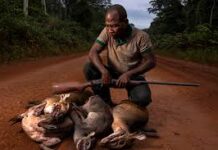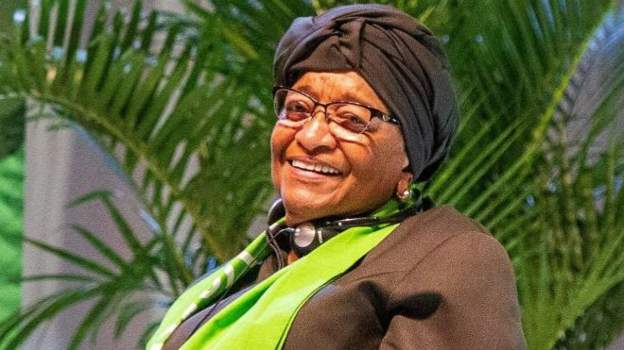By Mae Azango| Front Page Africa
Former Liberian President Ellen Johnson Sirleaf, a 2011 Nobel Peace Laureate, emphasized that Liberian women’s enduring commitment to peace, even in the face of adversity, has been the foundation for the peace Liberians now enjoy.
She called on all Liberians to celebrate and honor the women who stood at the forefront of the peace movement.
Speaking at the Monrovia City Hall during an event marking Liberia’s 20-year celebration of peace since the signing of the 2003 Accra Comprehensive Peace Agreement that ended the war in Liberia, Madam Sirleaf said, “Today is just an event, but the continuity and maintenance of peace depend on each and every one of us. Therefore, we should avoid using defamatory statements because they undermine our constitution. We say to all of you: if we want peace, speak and act rightly. Pray for peace, live for peace, champion peace, and be ambassadors of peace.”
The program, which brought together government officials and dignitaries, was organized by UN Women in partnership with organizations such as Women of Liberia Mass Action for Peace, EJS Center for Women and Development, ECOWAS, Ministry of Gender, Children, and Social Protection, Embassy of Sweden, Embassy of Ireland, and various youth and UN agencies. Liberian women and youth also graced the occasion.
Swedish Ambassador Urban Sjostrom introduced the two Nobel Peace Laureates, former President Ellen Johnson Sirleaf and Leymah Gbowee of the Gbowee Peace Foundation, who, although currently out of Liberia, delivered a short video message. Gbowee reflected on the historic signing of the Accra Comprehensive Peace Agreement in 2003, which brought an end to Liberia’s deadliest civil war in Africa. Thousands of lives were lost, and many were displaced, with properties worth millions destroyed. Yet, today, Liberians can look back with gratitude, knowing that Liberian women played a pivotal role in the fight for peace.
Gbowee concluded her message by saying, “We have experienced three peaceful elections since the signing of the CPA. As we approach future elections, let us remember our past, appreciate our present, and work toward a peaceful future. Say no to war, no to violence, and no to negativity. We are Liberians first, Liberians today, and Liberians always.”
UN Women Country Representative, Madam Comfort Lamptey, recalled that twenty years ago, Liberian women made history by demonstrating that women, working together with unity and determination, could accelerate a country’s journey towards peace. While the peace agreement in Liberia might have eventually been signed, the voices, stories, and efforts of Liberian women expedited the process.
Madam Lamptey also highlighted how Liberian women made history again in 2005 by electing Africa’s first female President. This remarkable achievement showcased that a woman of substance could successfully lead a war-torn country through the challenging process of recovery, peace-building, and development. In 2011, two Liberian women were awarded the Nobel Peace Prize, further solidifying Liberia’s place in history as the only African country with two female Nobel laureates.
Lamptey emphasized that, as Liberia commemorates 20 years since the signing of the Accra Peace Agreement, this is the perfect moment to reflect on how this impressive historical record can be used to promote and support women’s leadership in maintaining the hard-fought peace. She stressed the importance of inter-generational exchange, where the knowledge, experience, expertise, and talents of women peacebuilders from different generations can be harnessed to defend and sustain Liberia’s peace during these unstable times in West Africa.
The event included an interactive and inter-generational panel discussion featuring Christian and Muslim Women of Liberian Women for Peace Action alongside young women. Atty. Facia B. Harris and Ms. Vickjune Wutoh served as moderators.
The older women, including Vaiba Flomo, Cecelia Danuwali, and Ms. Baindu Saturday, discussed numerous challenges they faced, such as the disarmament of ex-soldiers during the Demobilization, Disarmament, Reintegration, and Resettlement (DDRR) program carried out by the United Nations at the time, as well as the reintegration of former fighters into their communities. Dr. D Evelyn Kandai emphasized the importance of girls’ education, referencing her work with FAWE.
The young women on the panel, including Massa Dugulu, Nusone Perkins, and Hawa Dunor Varney, spoke about the value of learning from their elders and the importance of involving young people in decision-making processes that affect them.






















